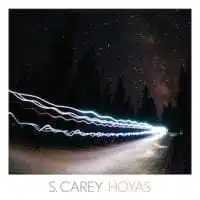
As the Bon Iver extended family grows, the genetic traits become more distinct. The blurred, electronic-tinged production that was a mere suggestion on For Emma, Forever Ago has since turned up as the beating heart to Bon Iver’s self-titled follow-up, the color in the cheeks on Gayngs’ neo-yacht rock, and the conflicted mental state of Poliça’s swirled R&B. Drummer/pianist Sean Carey, one of Justin Vernon’s earliest recruits and current band director for the now-massive Bon Iver touring lineup, probably has as much claim to this loose aesthetic as Vernon himself and Gayngs/Poliça producer Ryan Olson. But while the sound is a hereditary feature in those other contexts, it’s the spine of Carey’s solo work.
Free from the indie folk, soft rock, and R&B that dictate the terms for Vernon and Olson, Carey’s take on the sound is more amorphous, but compelling with the right ornamentation. On his 2010 debut, All We Grow, pop melodies and Carey’s likeably pretty vocals gave shape to his signature atmospherics and intricate, minimalist percussion patterns. On this four-song follow-up, however, Carey and chief collaborator Ben Lester seem slightly too enamored of their production choices. Carey largely trades the live instrumentation of All We Grow for stock-software sounds, and he autotunes his vocals into indecipherable mush. His favoring of production approach over song repeatedly sabotages the album’s best hooks, as expansiveness and overworked rhythmic detail translate into a timidity towards pop directness. In fact, if both songs weren’t two minutes too long and suffused with arty ambiguity, “Avalanche” and “Two Angles” suggest a smart, layered Postal Service substitute that could easily shame Owl City.
As his past work suggests, Carey’s favoring of rhythm and free-floating melodies over traditional verse-chorus song structures plays very well when anchored by the textures of live instruments and clear vocals. Forcing a similar style through a filter of laptop presets and masked vocals, on the other hand, only highlights how those convenient, but more limited, tools require tighter songwriting than Carey musters up on Hoyas.
